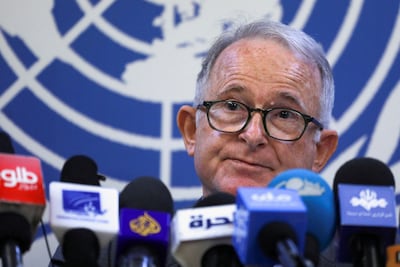The UN's Afghanistan rapporteur will tell the Human Rights Council on Monday that the international community's efforts to engage with the Taliban and supply humanitarian aid have emboldened Afghanistan's hard-line rulers.
UN human rights envoy to the country Richard Bennett has said more pressure was needed on Kabul as the rights of women and girls in Afghanistan had continued to deteriorate “incrementally”.
Weeks after a third round of UN-led peace talks with the Taliban in Doha, the UN's special rapporteur to Afghanistan described a hardening of rhetoric leading to tougher conditions in Kabul.
“It's step by step, tightening the grip,” he told a meeting of South Asians for Human Rights, a Colombo-based network. “When it first started, we thought that their rhetoric, that there was a gap between their words and their actions. There's not so much of a gap now, actually, and that's not a positive thing.
Their words have become more harsh, more exclusive, more based around national sovereignty. This is probably in line with the trend internationally, but particularly noticeable in Afghanistan” he said.

When Mr Bennett presents his findings at the UN Human Rights Council meeting, he said he will also call for more international pressure on the Taliban in a three-step plan. “I am in favour of dialogue with the Taliban, but not without a real plan and unity,” he said.
The group who had been fighting a US-led coalition for over 20 years took over the country in 2021, banning girls from attending secondary schools, and women from universities.
Though the Taliban had promised in the early days of its rule not to close schools and issue a general amnesty towards those who were fighting against them, these promises had been overturned. Their attempts to erase women and girls from public arenas have been described as a “gender apartheid”, which activists say should be considered a war crime.
Yet lack of “unity” or “cohesive plan” in the international community meant the Taliban's hardline positions could become further entrenched, Mr Bennett warned.
“The (Taliban's) strengths are the international community's weaknesses. They have an ideology. They have been successful in implementing it. They believe in themselves,” he said.

“The international community has none of those things. It doesn't have a plan, it doesn't have coherence, and it has no confidence in what it's doing either.”
The Security Council Resolution 2721 to appoint a Special envoy in Afghanistan had been a step in the right direction. But the meetings in Doha, from which Afghan civil society was excluded, sent the wrong message.
“A message was sent to the Taliban that they can continue to crack down on human rights and the rights of women and girls especially, and there will be no consequences,” he said.
Humanitarian aid, which many say has been misused by the Taliban, could be restricted as a form of pressure. “I'm not against providing humanitarian support to the people of Afghanistan, but at the moment, we are also emboldening the Taliban with it,” he said.
Afghan women living under Taliban rule – in pictures
The US-led coalition in Afghanistan also needed to acknowledge its detrimental role in Afghanistan, with the UN introducing accountability processes that pre-date the Taliban's takeover in 2021.
“There is little or no admission of the by the international community of the its responsibility for the situation that Afghans find themselves in,” he said.
The Taliban needed to be pressured to improve the human rights situation in Afghanistan. “Any normalisation of engagement with the de facto authorities must be based on demonstrable, measurable and independently verifiable, verified improvements and human rights,” he said.
An “all tools” approach to assess the human rights situation in Afghanistan would include the international courts, and an assessment of whether “gender apartheid” was being committed against women and girls.
Transitional justice and accountability shouldn’t start from August 2021, but look at the “root causes”. The International Criminal Court's case on Afghanistan was rightly focused on the Taliban, Mr Bennett said, but did not look at crimes committed by the US-led coalition.
“Afghanistan, suffered four and a half decades of conflict. Some people would say that is not over yet. There have been human rights violations committed by all parties to the conflict over decades. That should be addressed,” he said.

















